Congress is actively debating new crypto tax rules ahead of the 2026 filing season. Recent proposals aim to clarify how digital assets are taxed, especially with new IRS reporting requirements in place for 2025. As lawmakers work on balancing regulation with innovation, they’re also addressing challenges around classifying digital assets and managing enforcement. If you stay informed, you’ll better understand how these changes could impact your crypto reporting obligations. To learn more, keep exploring how these legislative efforts continue to evolve.
Key Takeaways
- Congress is debating legislative proposals like the BITCOIN Act to clarify digital asset tax treatment before 2026 filings.
- Recent bills aim to define crypto classification and regulation, impacting reporting requirements for taxpayers.
- Bipartisan efforts have temporarily nullified IRS DeFi broker reporting rules, complicating compliance.
- Ongoing discussions focus on balancing innovation with enforcement and resolving classification ambiguities.
- Pending legislation may introduce new tax rules and reporting standards ahead of the 2026 filing season.
Recent Legislative Movements Shaping Crypto Tax Policy
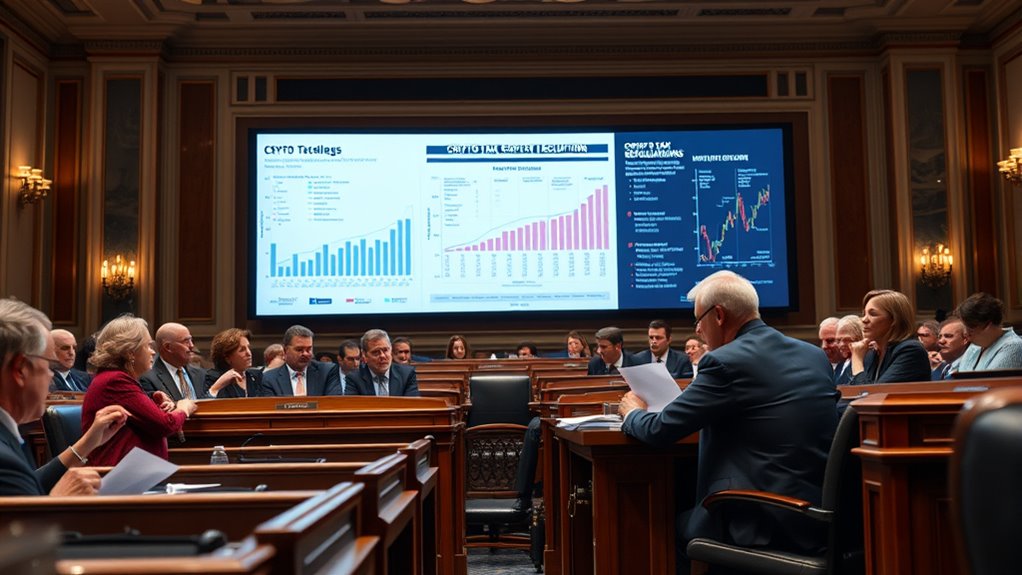
Recent legislative movements are actively shaping the future of crypto tax policy in the United States. You should know that the Trump administration proposed a new tax class for digital assets, aiming to integrate crypto fully into the tax system. Congress is reviewing bills like the BITCOIN Act of 2025 and the Digital Asset Market Clarity Act, which seek to clarify how digital assets are taxed and regulated. Recently, legislation also nullified IRS reporting requirements for DeFi platforms, showing bipartisan pushback against overregulation. These efforts reflect a focus on resolving long-standing uncertainties around crypto taxation, such as wash sale rules and cost basis reporting. Additionally, lawmakers are considering relationship dynamics that promote collaboration between regulators and industry stakeholders to develop balanced policies. Overall, these legislative movements aim to balance innovation with compliance, shaping a clearer and more consistent tax landscape for crypto investors.
Key Proposals and Bills Under Review in Congress
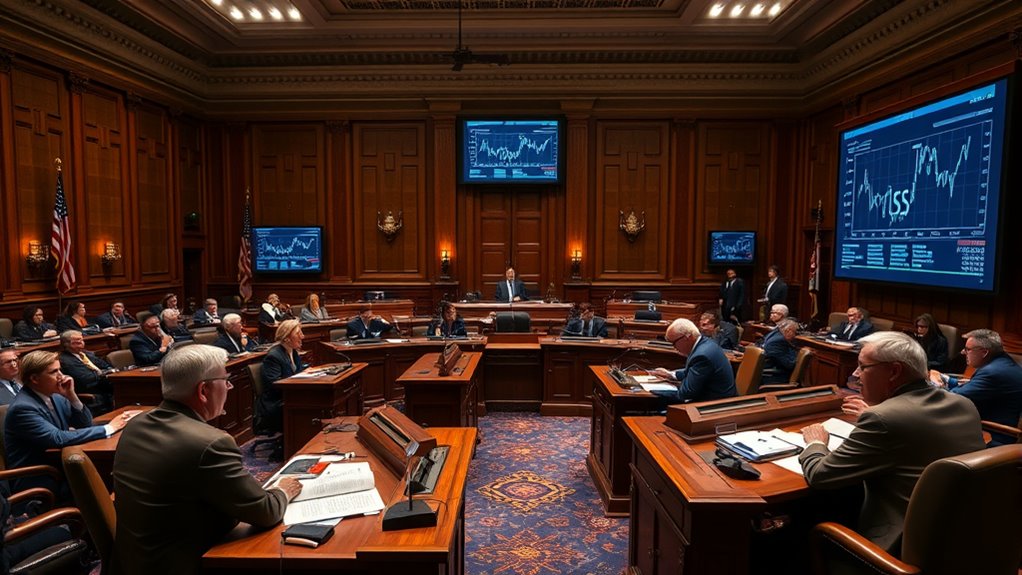
Congress is currently reviewing several key proposals aimed at clarifying and modernizing crypto tax regulations. These bills seek to address ambiguities in how digital assets are taxed and reported. The BITCOIN Act of 2025 proposes thorough frameworks for crypto taxation, while the Digital Asset Market Clarity Act aims to clarify regulatory boundaries. Here’s a quick overview:
| Bill Name | Focus Area |
|---|---|
| BITCOIN Act of 2025 | Establishes clear tax rules for digital assets |
| Digital Asset Market Clarity Act | Clarifies regulatory environment |
| H.R. 3633 | Defines tax treatment and compliance |
| DeFi Reporting Legislation | Temporarily relaxes DeFi reporting rules |
These proposals reflect Congress’s effort to balance innovation with tax enforcement, but progress remains limited.
The Impact of the 2025 IRS Reporting Requirements

Starting in 2025, the new IRS reporting rules will make your crypto transactions more transparent, requiring exchanges to share detailed data. This means you’ll need to keep careful records of transfers between wallets, as tracking becomes more complex without broker involvement. These changes will increase your compliance demands but also aim to improve accuracy in calculating taxable gains. Additionally, color accuracy in reporting can significantly influence how effectively taxpayers can verify their transactions.
Enhanced Transaction Transparency
The 2025 IRS reporting requirements considerably enhance transaction transparency by mandating crypto exchanges to provide detailed information on user transactions through new Form 1099-DA. This form captures gross proceeds from sales and exchanges, giving the IRS a clearer view of your crypto activities. As a taxpayer, you’ll need to report all transactions accurately, including sales, trades, and earnings, which increases the IRS’s visibility. The shift from universal to wallet-by-wallet accounting for cost basis calculation also improves accuracy but requires careful recordkeeping. These changes aim to reduce underreporting and close tax gaps, making your transaction history more transparent. Additionally, AI-driven analytics are increasingly used to detect suspicious activities and enforce compliance. Ultimately, this heightened transparency helps ensure compliance, but it also places greater responsibility on you to maintain precise records for all your crypto dealings.
Increased Compliance Demands
As the 2025 IRS reporting requirements take effect, your compliance obligations will considerably increase, demanding more diligent recordkeeping and transaction tracking. You’ll need to keep detailed records of every crypto sale, trade, and transfer, especially as brokers will soon report gross proceeds and, later, cost basis on Form 1099-DA. This shift means you must accurately track your wallet-by-wallet transactions to calculate gains and losses correctly. Additionally, transferring crypto between wallets no longer remains simple; you’ll need to document these movements carefully to avoid misreporting. The increased complexity heightens the risk of errors and penalties if you aren’t organized. To stay compliant, you’ll need to stay informed, possibly seek professional advice, and ensure your records are thorough and up to date before filing in 2026. Proper recordkeeping practices are essential to navigate these upcoming reporting challenges effectively.
Tracking Wallet Transfers
With the new IRS reporting requirements in 2025, tracking wallet transfers becomes more critical than ever. You’ll need to carefully monitor movements between wallets, as these transfers can trigger tax events or complicate your records. The IRS is increasing its oversight, expecting taxpayers to distinguish between personal transfers and taxable transactions. Failure to track transfers accurately could lead to penalties or missed reporting obligations. Utilizing clear records can also help prevent issues related to eye patch benefits or other areas of compliance in your financial documentation.
Congressional Reactions to DeFi and Decentralized Platforms
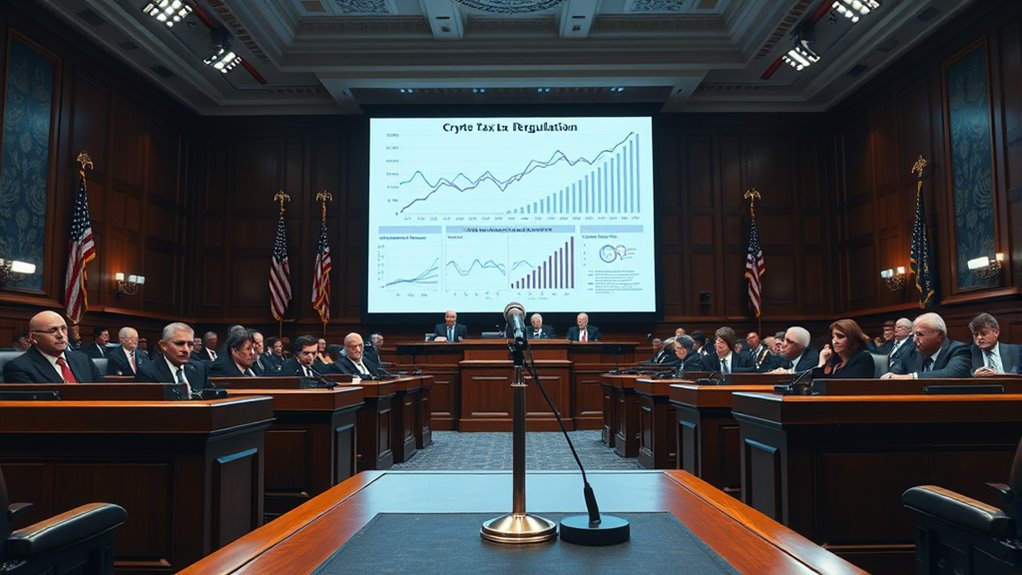
Congress has shown a mixed response to decentralized finance (DeFi) platforms, balancing innovation with regulatory concerns. While some lawmakers recognize DeFi’s potential to democratize finance, others worry about the lack of oversight and potential for illicit activity. In 2025, legislation temporarily nullified IRS reporting requirements for DeFi brokers, reflecting bipartisan resistance to overregulation. This move signals Congress’s cautious approach, aiming to support innovation without stifling growth. However, critics argue that without clear rules, DeFi platforms could operate in legal gray areas, risking consumer protection. Overall, Congress remains divided—supporting the sector’s technological advancements while grappling with how to regulate decentralized platforms effectively. This tension impacts future policymaking, as lawmakers seek a balance that encourages innovation without compromising oversight. Sizing and load‑planning tools can help better understand the potential impact of these platforms on the financial system.
Challenges in Clarifying Digital Asset Tax Classifications
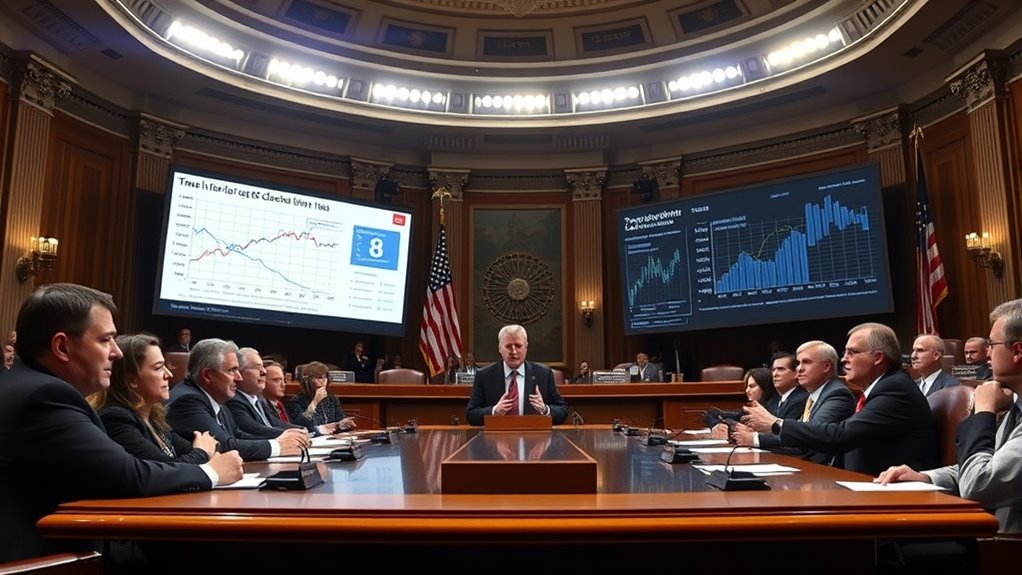
You face the challenge of clearly defining what counts as a digital asset to guarantee consistent tax treatment. Harmonizing tax classifications across different types of crypto and related financial instruments is complex and often ambiguous. Enforcement becomes even trickier when the boundaries are unclear, making compliance and oversight more difficult for authorities. Clear guidelines for vetted products can help streamline regulations and improve compliance efforts.
Defining Digital Asset Scope
Clarifying the scope of digital assets for tax purposes remains a significant challenge because these assets encompass a wide range of types and functions, each with distinct characteristics. You must differentiate between cryptocurrencies, tokens, and other digital holdings, which can serve varying purposes like payments, investments, or access rights. This complexity makes it hard to assign consistent tax classifications. Additionally, the diverse materials used in tableware, such as ceramic, glass, metal, and plastic, reflect different cultural and aesthetic values that can influence how these assets are perceived and valued in various contexts. Some assets are classified as property, while others may resemble securities or commodities, complicating reporting. Certain tokens, like staking rewards or airdrops, blur lines between income and investment gains. The evolving technology means new digital asset types continuously emerge, requiring ongoing clarification of their tax treatment.
Harmonizing Tax Classifications
Harmonizing tax classifications for digital assets presents a significant challenge because these assets defy traditional categories and can serve multiple functions. You might hold crypto as an investment, use it for transactions, or stake it for rewards—all under different tax rules. This ambiguity makes it difficult to determine whether a digital asset should be classified as property, currency, or something else. Congress and regulators struggle to develop clear, consistent classifications that cover these complexities. Without a unified framework, taxpayers face confusion and risk misreporting, which can lead to penalties. Clarifying tax classifications requires balancing innovation with regulatory clarity, ensuring digital assets are taxed fairly without stifling growth. Leveraging AI in Business can assist in analyzing and developing more effective classification standards. Achieving this harmonization is vital for effective enforcement and taxpayer compliance.
Addressing Enforcement Challenges
The ongoing challenge of enforcing crypto tax laws stems from the difficulty in accurately classifying digital assets. Without clear definitions, authorities struggle to determine taxable events and appropriate tax treatment. This ambiguity hampers enforcement efforts and increases compliance risks. You need to understand how digital assets are categorized and reported. Forsale 100 Clarifying how staking rewards, a form of income, should be taxed helps prevent underreporting.
These issues create gaps in enforcement, making it harder for the IRS to ensure compliance and for taxpayers to meet their obligations confidently. Clearer guidelines are essential for effective oversight and fair taxation.
The Role of State Laws in the Federal Crypto Tax Framework
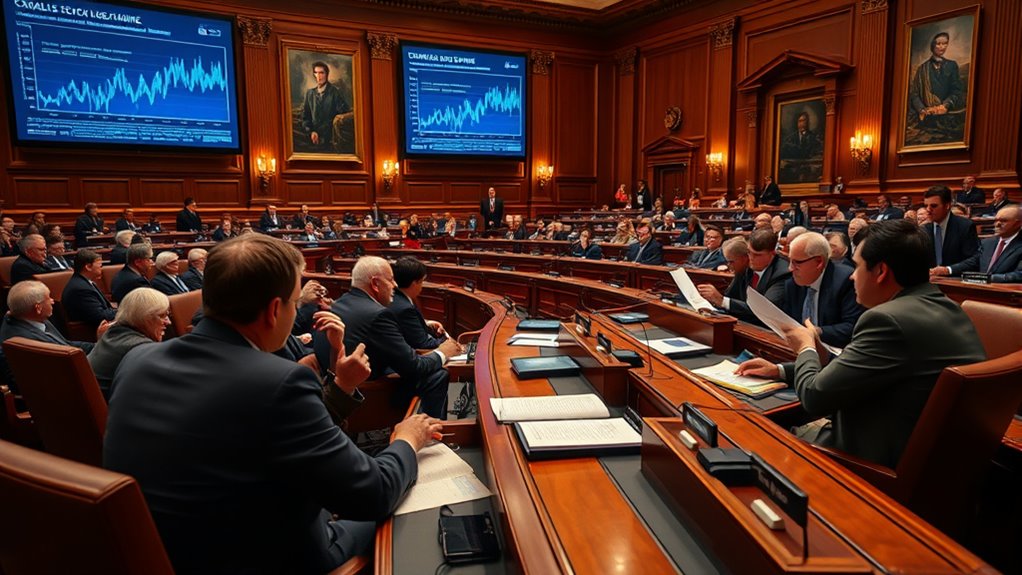
State laws play a vital role in shaping the overall crypto tax landscape, often creating a complex patchwork of regulations that can complicate compliance for taxpayers and businesses alike. Some states have adopted specific rules, such as taxing crypto transactions or requiring reporting, which may differ significantly from federal guidelines. These variations can lead to confusion, especially when state and federal laws conflict or lack coordination. For example, certain states may recognize digital assets differently, affecting how you report gains or losses. Additionally, states may impose their own licensing or registration requirements for crypto businesses, further complicating compliance. Charting this landscape requires staying informed about both federal and state regulations to ensure accurate reporting and avoid penalties.
Enforcement Strategies and Compliance Expectations
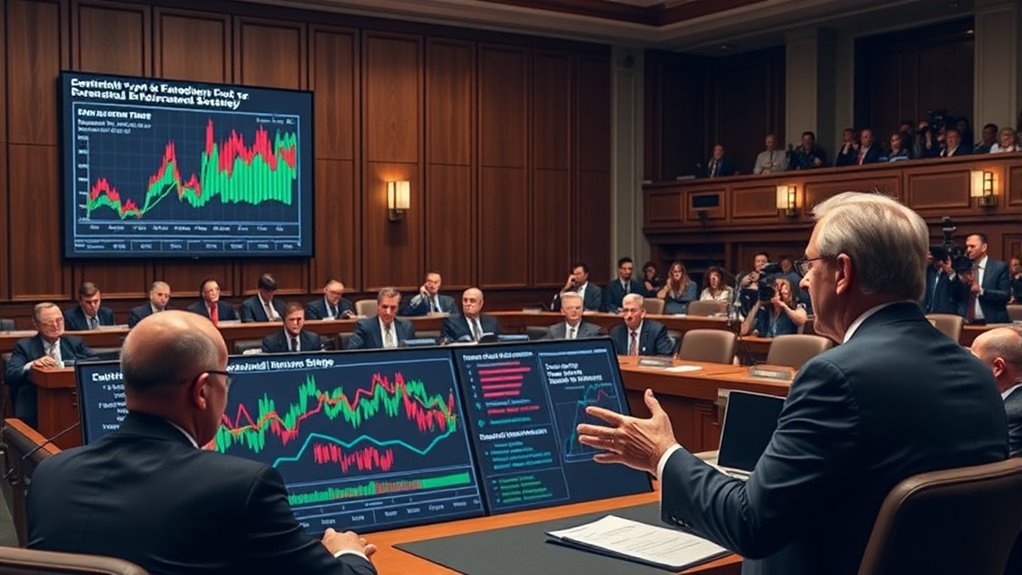
Enforcement strategies and compliance expectations have become central as the IRS ramps up efforts to guarantee crypto taxpayers follow the new reporting rules. You’ll need to stay vigilant, as the IRS is increasing its oversight and audit capabilities to catch non-compliance. Expect stricter penalties for underreporting or failing to report crypto transactions accurately. The agency is investing in advanced data analysis tools and collaborating with other agencies to track digital asset movements.
- The IRS is expanding its audit scope, targeting high-risk taxpayers and suspicious transactions.
- You may face penalties if you neglect to report crypto gains, losses, or transfers properly.
- Ongoing education and professional advice are vital to ensuring your compliance keeps pace with evolving regulations.
Future Outlook for Crypto Tax Legislation and Regulatory Development
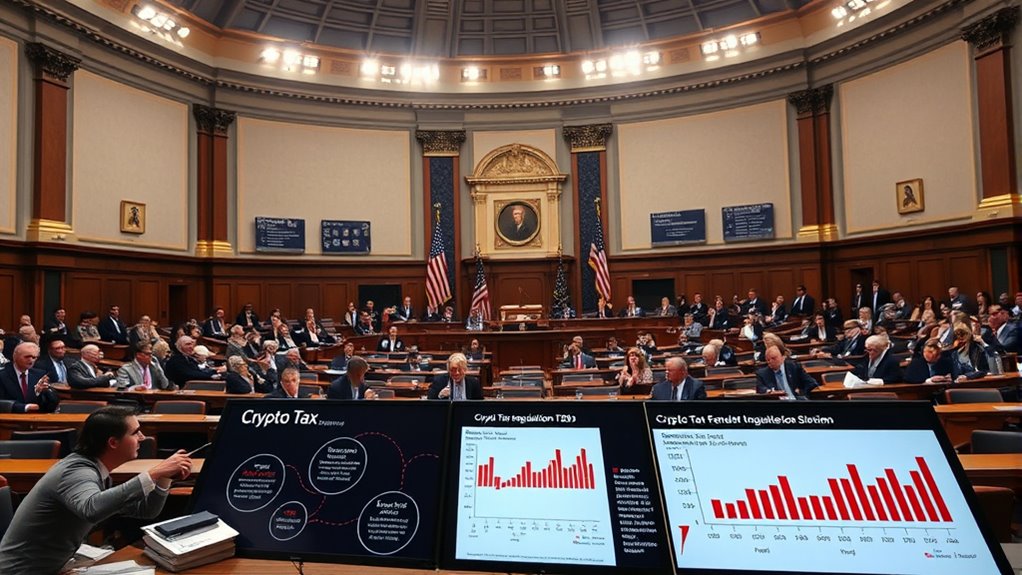
Looking ahead, the future of crypto tax legislation and regulatory development hinges on Congress’s ability to pass exhaustive reforms that clarify existing ambiguities. You can expect ongoing efforts to define digital assets precisely, addressing issues like wash sale rules and cost basis reporting. While proposals like the Digital Asset Market Clarity Act aim to streamline regulations, progress remains slow, risking increased offshore activity if clarity isn’t achieved. Congressional action on comprehensive tax reforms is vital to guarantee compliance and maintain U.S. competitiveness. Expect continued debates around balancing innovation with enforcement, especially as the IRS ramps up reporting requirements. Ultimately, clear, consistent policies are essential to foster investor confidence and prevent regulatory gaps that could undermine the integrity of the crypto market.
Frequently Asked Questions
How Might Future Legislation Alter Crypto Tax Reporting Obligations?
Future legislation could markedly change your crypto tax reporting obligations. You might face new rules that simplify or complicate your recordkeeping, such as expanded reporting requirements or different tax treatment for certain transactions. Congress could also introduce exemptions, alter the scope of reporting, or clarify how specific crypto activities are taxed. Staying informed and adjusting your tracking methods will help you comply with evolving laws and avoid penalties.
What Are Potential Tax Implications of Staking Rewards and Airdrops?
You know what they say, “nothing ventured, nothing gained.” Staking rewards and airdrops are taxable when you receive them, as IRS treats digital assets as property. When you earn rewards or receive airdrops, you must report their fair market value as income at receipt. Later, if you sell or exchange these assets, you could face capital gains tax. Staying compliant guarantees you’re not caught off guard during tax season.
Will Congress Define Digital Assets Distinctly for Tax Purposes?
Congress is working on defining digital assets separately for tax purposes, but clear legislation hasn’t been finalized yet. You should stay alert because proposed bills like the Digital Asset Market Clarity Act aim to specify how digital assets are classified and taxed. This clarity will help you better understand your tax obligations, especially regarding transactions, staking rewards, and airdrops. Keep an eye on legislative updates to stay compliant and plan your crypto activities accordingly.
How Could State Laws Impact Federal Crypto Tax Enforcement?
State laws could turn federal crypto tax enforcement into a chaotic circus if they clash or create loopholes. You might find yourself juggling different rules, with some states turning a blind eye while others impose strict regulations, making compliance a nightmare. This patchwork quilt of regulations could confuse IRS efforts, allowing savvy investors to exploit gaps or dodge taxes altogether. So, buckle up—federal enforcement might need a GPS to navigate this wild state-by-state ride.
What Enforcement Measures Will IRS Use to Ensure Compliance?
You’ll see the IRS stepping up enforcement by requiring crypto exchanges to report user transactions via new Form 1099-DA starting in 2025. They’ll also scrutinize your records more closely, especially with wallet-by-wallet accounting rules. The IRS is increasingly focused on catching unreported gains, so you should keep detailed records of all your crypto activity, including transfers and trades, and consider seeking professional advice to stay compliant.
Conclusion
As you follow Congress’s crypto tax debates, remember that over 80% of Americans support clearer regulations. With new bills on the table and IRS reporting requirements intensifying, staying informed helps you navigate upcoming changes. The evolving landscape aims to balance innovation with compliance, making it vital for you to understand how these rules may impact your digital assets. Staying proactive now ensures you’re prepared for the 2026 filing season and beyond.









